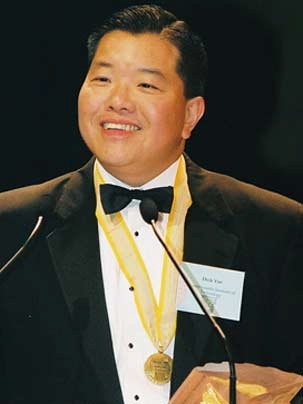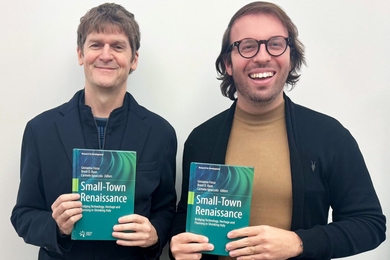MIT has recently received honors from three magazines, and several others in the MIT community also have been recognized for individual achievements.
Boston Business Journal named MIT as one of the top 50 best places to work in Massachusetts in its second annual statewide awards program. The award recognizes MIT's achievements in creating a positive work environment that attracts and retains employees through a combination of benefits, working conditions and company culture. The Institute was one of more than 140 employers to qualify for consideration, making the top 50 list based on the strength of its benefits and programs and employee evaluations.
The Institute is a co-winner of the Computerworld 21st-Century Achievement Award in Education and Academia. MIT and Sapient Corp. were selected by the Computerworld Honors Foundation for their work to develop MIT OpenCourseWare, which was named as the best application of information technology in the field of education. The awards were presented by Patrick J. McGovern (S.B. 1959), founder and chairman of International Data Group, which publishes Computerworld, and Maryfran Johnson, the magazine's editor in chief.
William H. Gates, chair and chief software architect of Microsoft, nominated MIT and Sapient for the award in recognition of the OCW project's contribution to the global information technology revolution and its positive impact on society.
"Since the launch of our proof-of-concept pilot in fall 2003, the MIT OCW web site has received traffic from users in more than 215 countries, city-states and territories, making it a truly global initiative," said Anne H. Margulies, executive director of OCW. "Our partnership with Sapient enabled us to provide a reliable and user-friendly site for educators and learners around the world, and it is a wonderful honor to be jointly recognized with Sapient by the prestigious Computerworld Honors program."
In its May issue, Entrepreneur magazine put MIT in the top 10 U.S. entrepreneurial colleges and universities. The rankings were based on course offerings, faculty, business community outreach, research centers, and faculty/alumni evaluations. MIT was ranked fifth in the nation, behind Babson College (#1), the University of Arizona, the University of Pennsylvania's Wharton School and the University of North Carolina at Chapel Hill.
Others at MIT who have recently received awards include:
Professor of Nuclear Engineering Otto K. Harling, who was named an ANS Fellow by the American Nuclear Society. Harling's citation acknowledges his "outstanding contributions to the conception, design and construction of an improved neutron inelastic scattering spectrometer." This instrument enabled the measurement of inelastic scattering spectra at much higher energies than had previously been possible. Harling was also recognized for his work on boron neutron capture therapy, a form of radiation therapy that can destroy cancerous cells while sparing adjacent healthy cells. Harling directed the design and construction at MIT of an advanced epithermal neutron irradiation facility for neutron capture therapy. It is the only such facility in the United States and is recognized as the best in the world.
Professor John Heywood, the Sun Jae Professor of Mechanical Engineering and director of the Sloan Automotive Laboratory, who received an honorary Doctor of Science degree for "his distinguished contribution to automotive engineering" from City University in London at its Commencement exercises on May 5. Heywood, a London native, delivered the University's Edwards Lecture, sponsored by the City of London's Worshipful Company of Scientific Instrument Makers. His lecture was titled "On the Road in 2025: Sustainable Technologies for the Future."
Lt. Col. Brian L. Baker, who received the General Tasker H. Bliss Medal for ROTC Leadership from the Society of American Military Engineers. Baker was cited for his outstanding contributions to the profession as an engineer, educator and leader. Baker, who received S.M. degrees in civil and environmental engineering and in political science in 1992, is professor of military science for the Army's ROTC program at MIT with responsibility for partnership schools at Harvard, Tufts and Wellesley.
Moe Win, the Charles Stark Draper Assistant Professor of Aeronautics and Astronautics, who received a Fulbright Senior Specialists grant in Information Technology at University of Oulu in Finland. The Fulbright Senior Specialists Program offers two- to six-week grants to U.S. academics and professionals to support curricular and faculty development and institutional planning at academic institutions in 140 countries.
Bill Arning, curator of the List Visual Arts Center, who will be honored by Exit Art, an alternative arts center in New York, at its "Hell's Ball" on June 23. The event benefits Exit Art's emerging artists program. Arning is being recognized for his "extraordinary support" of emerging artists. "We think Bill Arning has visited more studios than anyone else in New York in support of emerging artsts," said Regann Grusy, Exit Art's development director.
Katie Livingston-Vale, a senior faculty liaison in Information Servives and Technology (IS&T), and Donald R. Nelson, a systems administrator in the Plasma Science and Fusion Center, who received Neiterman Awards. The awards are given each year by IS&T to information technology workers in any department at MIT, to recognize collaborative problem solving, coaching colleagues, team-building, sharing knowledge and a commitment to creating community at MIT. The program honors Steven Wade Neiterman, an Information Systems employee who died in 1998. For more information, see http://web.mit.edu/ist/wadeaward.
Professor of Biology Robert Weinberg, who was selected as one of five winners of the Prince of Asturias Award for Scientific and Technical Research, awarded by the Prince of Asturias Foundation in Spain. ''From their different lines of investigation these scientists are at the vanguard of the fight against the set of diseases known as cancer, one of the greatest scientific challenges that humanity faces,'' said jury president Julio Rodriguez Villanueva. Weinberg was praised by the jury as ''one of the pioneers of cancer's genetic makeup."






